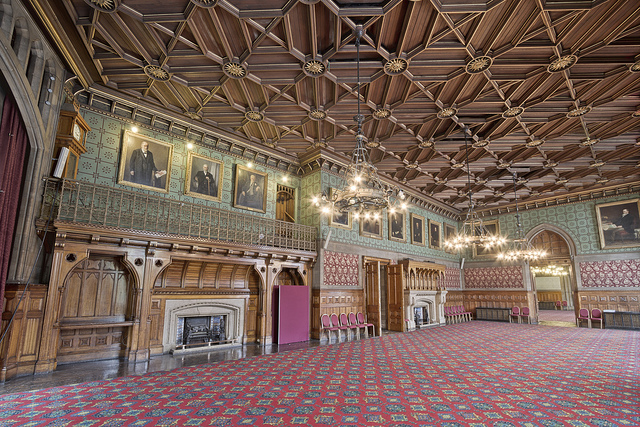The next step for local government should be the right to pass primary legislation
Councillors are currently limited in how much influence they are able to have over their local area, locked in local governance networks in which they feature but don’t control. Assessing these networks and their democratic credentials, Colin Copus concludes that the right to pass primary legislation, over for example the legal drinking age or fox hunting, would refocus politics on local government at the expense of the centre.

Credit: Michael D Beckwith, CC BY 2.0
In England, the main three national political parties hold just over 90 per cent of all council seats, and in such a party politicised system of local government councillors can pursue party policy by claiming they have a mandate to act. But, as governments of one colour or another alter the landscape of local governance and reshape and recast the powers, roles, responsibilities, functions and tasks of local government, councillors are confronted with a struggle for engagement in a complex series of networks.
Those networks are made up of a myriad of unelected bodies, with no direct lines of accountability to the public and many players within them cover a greater territorial area and have more resources available to them than some of the councils within their areas. The shift from local government to local governance places an additional burden on councillors and the councils of which they are members, both of whom must now engage in and exert influence over complex multi-layered networks, within which they confront often higher-level players. Those higher level players lack the democratic mandate given to councillors which those un-elected players that spend public money and make and implement public policy lack.
Voting sustains the link between councillors and citizens and grants them legitimacy to act. Local elections provide a link between the council and the citizen which is not some antiquated, romantic hang-over from the Victorian experiments with local democratisation. Rather, it provides councillors with legitimacy to conduct two tasks vital to local democracy: first, transferring the views of citizens into governance networks; and, second, working as an elected representative to democratise networks and their players by holding them to account. Despite the low level of governing power held by councillors in England, local representative democracy has a role in shaping what unelected and unaccountable networks do. Indeed, it may fast becoming all that is left to local government.
A strong local democracy would enable councillors to control the activities and policies of those that casually operate within governance networks with no real democratic mandate to do so. Currently however, councillors must settle for influence over their unelected counter-parts but such influence can only be secured if councillors engage in networks and that such a task is not left to leaders and executive councillors alone. Indeed, indulging in governance networks may now be the only game in town for English local government and one which has replaced ideas of councils delivering all the important public services in its area and making all the important public decisions. That is not to say local government does not have an important delivery role as it still provides a range of services vital to modern industrial societies, but if local government must move beyond a focus on services to governing and that can only be achieved through engagement with networks of one kind or another.
There is a positive outcome from the squeeze on public finances and the tinkering with local government responsibilities by the centre as well as the gradual loss of its primacy as a service providing body. That faint hope is that councillors are now looking beyond the immediate responsibilities of their councils to seek influence and direction over the decisions made by others. Councillors are developing a role that encompasses governing through interaction within networks. Indeed, we can see that councillors, and particularly leading councillors, are jettisoning – even if reluctantly – some of the worst excesses of ideological politics focused on tired and stale party political exchanges in the council and embracing network interaction.
What is clear however, is that the presence of councillors in governance networks is no guarantee that they will transfer citizen views to governance players or seek to effectively hold those players to account. The danger is that councillors play the role of a member of one board, trust or body and take part in that organisation’s decision-making processes. Rather than simple membership of a board, what is required is for councillors to join-up the activity of the range of network players and to oversee and shape the direction of a network as a whole, pulling it into the direction favoured by the democratically elected council.
If local government faces competitors in the world of service provision and by consequence a lightening of the load of public service delivery, then the alternative that remains is to focus on government through governance networks. If this relies on the individual councillor’s preference for focusing on either the internal working of the council or the governing of the external world then the danger is that democratic oversight might be marginal and thinly spread. Indeed, attempts at the democratisation of networks could simply be left to luck, or the development in any one council area of a critical mass of councillors that recognise a broader political role beyond the council and dedicate themselves to the task of bringing order to the chaos of governing networks.
All councillors, not just leaders and executive members, must be willing to establish strong links with external partners and to transfer the policy preferences of the democratically elected council to those bodies. Without that willingness and ability councils and councillors merely attenuate the power of unelected governance networks, rather than direct or control them. So, maybe the next change to the role for local government is for councils to have comparable governing powers to the centre. At the moment the three main parties are involved in a devolutionary auction claiming that they will devolve most to local government – but experience tells that what the centre offers, if it does deliver, it can take away again.
One of the things driving the three parties devolutionary auction to local government is the desperate desire they all have to avoid granting to England that which they seem very happy to rest with Northern Ireland, Scotland and Wales: a parliament, government and first minister of its own. So, how about this for a devolutionary leap: grant to local government and democratically elected councillors the right to pass primary legislation that has effect within the council area alone. Such a move would politically re-focus attention away from the centre towards powerful local governing bodies – councils. Thus, a pressure group seeking to have some legal activity banned or abolished, or seeking changes in the law would not have to fight one political battle aimed at Westminster and Whitehall – rather, it would have to fight 352 campaigns across each existing council area. If for example, a council wished to ban smoking in public, but to permit fox-hunting and another council wished to do the reverse, and at the same time, raise the age at which it was possible to drink alcohol to 25, then so be it! Now that would give our councillors and communities real power.
—
Note: this post represents the views of the author and not those of Democratic Audit or the LSE. Please read our comments policy before posting.
—
 Colin Copus is Professor of Local Politics and Director of the Local Governance Research Unit in the Department of Politics and Public Policy, De Montfort University. He tweets @ProfCopusLG.
Colin Copus is Professor of Local Politics and Director of the Local Governance Research Unit in the Department of Politics and Public Policy, De Montfort University. He tweets @ProfCopusLG.





 Democratic Audit's core funding is provided by the Joseph Rowntree Charitable Trust. Additional funding is provided by the London School of Economics.
Democratic Audit's core funding is provided by the Joseph Rowntree Charitable Trust. Additional funding is provided by the London School of Economics.
A rather good piece on local democracy: next step for local government to pass primary legislation? https://t.co/rrCfJwtcvA #localgov
More local power is great, but very difficult at a time when major powers are being constantly transferred to the new ‘centre’ of government within the EU. You cannot devolve down what has already been devolved “upwards”.
OK, all potential legislation has to be examined to see whether it complies with our masters’ requirements, but what if an awful lot of what people want to do does not? It exposes the EU’s control in a cruel and dangerous way. One of the reasons why this is so problematic for those who hold the reins of supposed power (Westminster) is that it exposes their own powerlessness if they cannot devolve vital powers.
In Switzerland over 20 years ago, during the campaigns to see whether the country should even consider joining the EU, an EU official became embroiled in a tv row about the well-known local referenda process in the country. In essence he said most of these would be illegal if Switzerland joined the EU and that it was “not democratic or possible” to try and avoid both the acquis communautaire, or to oppose the EU’s control of the areas it now did because this represented an attack on co-operation between members.
One person’s ‘devolution’ is another’s ‘postcode lottery’ and we know which side the ever-more powerful EU is on – centralisation of control even of the minutiae every time. The EU has at least to be part of the argument and not just an elephant in the room that no-one wishes to refer to.
The next step for local government should be the right to pass primary legislation #localgov #UK https://t.co/3THGU4z1Z1
Local government should have the right to pass primary legislation, argues @ProfCopusLG on @democraticaudit: https://t.co/GDEs7b306J
The next step for local government should be the right to pass primary legislation https://t.co/WgOIU5Rf79
The next step for local government should be the right to pass primary legislation https://t.co/FhmaTr7oPL #Option2Spoil
Let councillors pass primary legislation on eg drinking age or fox hunting, argues @ProfCopusLG on @democraticaudit: https://t.co/itfhNRkQ1Y
The next step for local government should be the right to pass primary legislation https://t.co/m12NDIMF4p